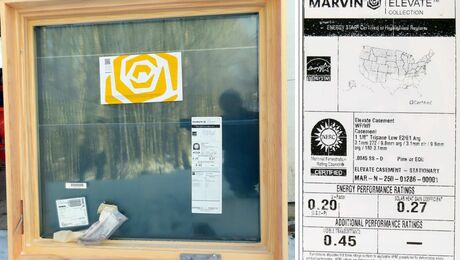Can I insulate between brick veneer siding and the wall studs?
I have a home built in 1977 and my south wall is cold in the winter. Can I safely inject foam insulation in the air gap behind the brick veneer. The company that does this work told me it was okay to do this; however, no one I have asked that laid the bricks or sold the bricks thinks it is a good idea. They tell me that this area is needed to get rid of any moisture that might happen between the brick and the gypsum board backing. I have been told I need this space for moisture to evaporate. . I do have fiberglass insulation but this wall is still cold. When my brick was laid, weep holes were not put in because this was not done at that time. I have a hard brick so I don’t believe moisture is getting behind the brick as there is no sign of any moisture in the basement. My question is, do you think I can fill this space with foam?
GBA Detail Library
A collection of one thousand construction details organized by climate and house part









Replies
Roger,
The masons are right and the foam insulation installer is wrong. Cross that foam installer off your list and never call the company again.
the foam won't be thick enough to keep the sheathing/interior side of it warm enough to prevent condensation (it will be below the dew point), the coverage will be sloppy and if done improperly you could damage the brick or frame of the house
Follow Martin's advice
Roger,
Studies have shown that wind-driven rain passes easily and quickly through brick veneer. The air space behind the brick veneer is essential. It allows liquid water to drain down to flashing; the water is directed by the flashing to weep holes. The air space also speeds drying, so that any remaining moisture in the air space can evaporate.
Adding weep holes in the vertical mortar every third brick or so at or near the bottom course. If the top of the veneer cavity isn't already vented under the eaves (it's often vented into the attic, which isn't always a good thing), adding corresponding vent holes in the mortar lines at the top course of the brick veneer will take the moisture drives experienced by the studwall down significantly. The heat loss of the studwall will cause a slow 24/7 convection loop during the heating season, displace the damp cavity air with drier outdoor air. Then, when the sun heats the brick, driving off dew/rain acquired moisture (the highest moisture drives the studwalls typically see) the convection rates go up a few orders of magnitude, purging that super moist air toward the exterior more quickly than the average convection rate.
Thanks for the responses. I have had 9 different people tell me not to insulate and only the installer says it is good. He says he has been doing it for 5 years and his supplier for 20 years with no problem. I think the no's outweigh the yes's too much to attempt it. Again thanks.
It's not like it's never done, but every thing has to be right (including the climate) for it to be low risk.
In the UK they sometimes fill cavity walls with EPS beads coated with adhesive. It ends up at about R2/inch and (unfortunately) adds capillary bridging between the brick and the rest of the wall, but it can work in some types of cavity walls in temperate climates.
Non-expanding injection foams are too risky due to their higher vapor permeance, and the slow-rise expanding foams have their own set of issues. SFAIK they don't use those products in this application even in the UK.